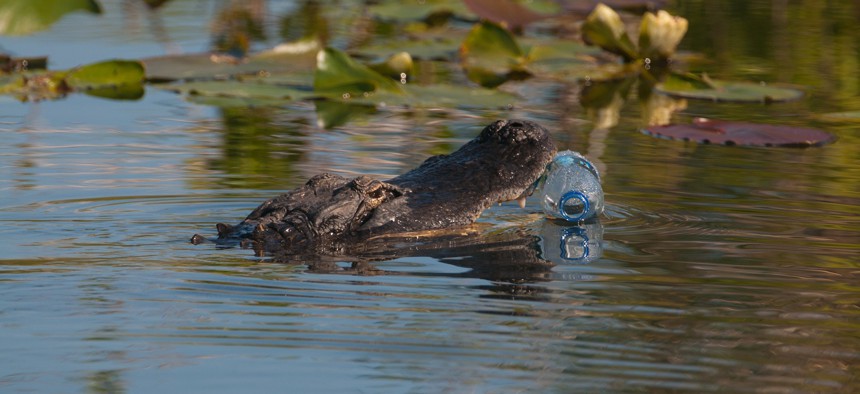
An alligator attempts to eat a plastic bottle in Everglades National Park. David Tipling / Universal Images Group via Getty Images
Interior Department to Phase out Single-Use Plastics on All Public Lands
Agencies including the National Park Service will have until 2032 to eliminate them.
In January, a poll commissioned by the ocean conservation nonprofit Oceana showed that 82 percent of Americans would support a ban on the sale and distribution of single-use plastics by the National Park Service. Now, that vision will become a reality. The Department of the Interior, or DOI, has announced a phaseout of single-use plastics — not only in national parks, but across the hundreds of millions of acres of public lands that the department manages.
“The Interior Department has an obligation to play a leading role in reducing the impact of plastic waste on our ecosystems and our climate,” Interior Secretary Deb Haaland said in a statement on Wednesday. Her Order No. 3407 sets a target of phasing out all single-use plastic products on lands that the department manages by 2032.
The announcement is part of a series of actions unveiled by the Biden administration in recognition of National Ocean Month and World Ocean Day on June 8. As the White House acknowledged in a recent press release, healthy oceans help to regulate the climate, support biodiversity, and sustain millions of jobs in fishing and other industries, but they are under threat from climate change and a growing amount of plastic pollution. According to the DOI, at least 14 million tons of plastic end up in the ocean each year, strangling marine life and introducing hazardous chemicals into the food system.
The DOI’s new announcement is intended to help stem the flow of ocean-bound plastic pollution by limiting the procurement, sale, and distribution of single-use plastic products and packaging across hundreds of millions of acres of federal land — including national parks, monuments, wildlife refuges, and more. As the producer of nearly 80,000 tons of municipal solid waste annually, the agency says it is “uniquely positioned” to drive down plastic pollution and its deleterious impacts to the climate and environment.
Within 270 days, the DOI’s order will require bureaus and offices that the department oversees to submit sustainable procurement plans charting a path toward the 2032 phaseout of single-use plastic. Under the order, agencies like the National Park Service, the Bureau of Land Management, and the Fish and Wildlife Service will have to analyze alternatives to single-use plastic, including attempts to shift public behavior by, for instance, installing more water fountains. They will be required to report back to the DOI in annual progress updates.
The move represents the culmination of a drawn-out saga to get single-use plastics out of public lands — especially national parks. Starting in the early 2010s, individual national parks like Grand Canyon and Zion began banning the sale of plastic water bottles within their borders — a policy that by 2017 had stopped the sale of up to 111,743 pounds of plastic annually across 23 national parks. But the Trump administration revoked national parks’ authority to ban plastic bottles in 2017, sparking outcries from lawmakers and environmental groups.
Throughout 2021, these groups called on Haaland to issue a National Park Service-wide directive addressing not only water bottles, but all single-use plastics. Bills introduced in the House and Senate last year would have mandated the same thing.
Advocates are now celebrating the DOI’s announcement. “The Biden administration has taken a big step to protect our oceans from plastics,” said Christy Leavitt, plastics campaign director for Oceana. “We’re excited that today’s announcement goes beyond just water bottles and beyond allowing individual parks to take action, but requires system-wide change.” She also commended the DOI for recognizing that recycling is not enough to address the problem, as only 9 percent of all the plastic waste ever generated has been recycled and the U.S. plastic recycling rate remains abysmally low at just 5 or 6 percent.
In addition to phasing out single-use plastics from lands managed by the Department of the Interior, the Biden administration also announced on Wednesday that it would develop a government-wide Ocean Climate Action Plan, work with tribes to protect the Northern Bering Sea, and seek to create a national marine sanctuary in the biodiverse Hudson Canyon, 100 miles off the coast of New York and New Jersey.






